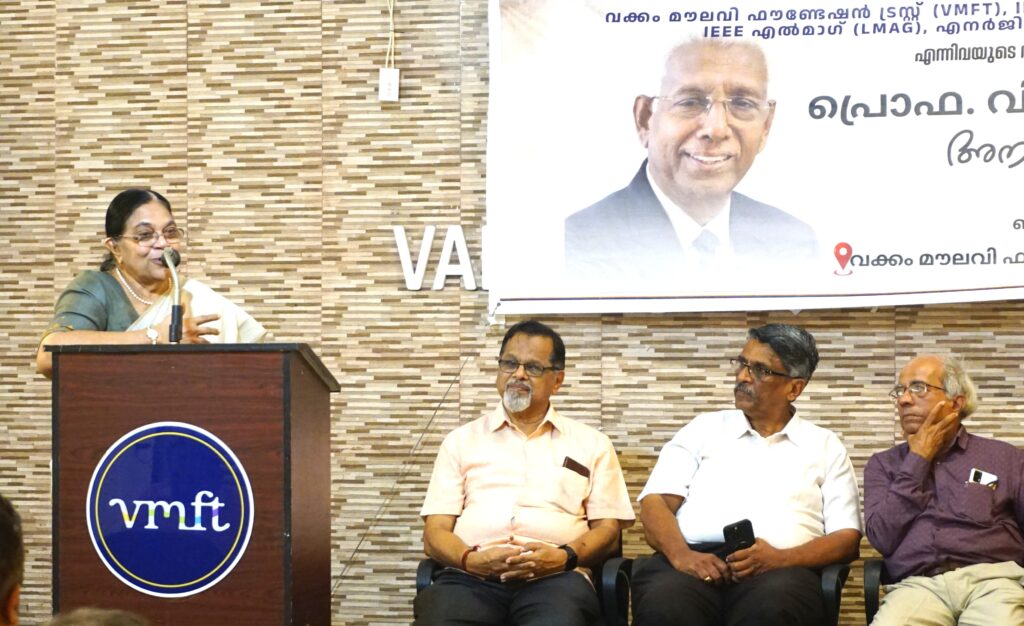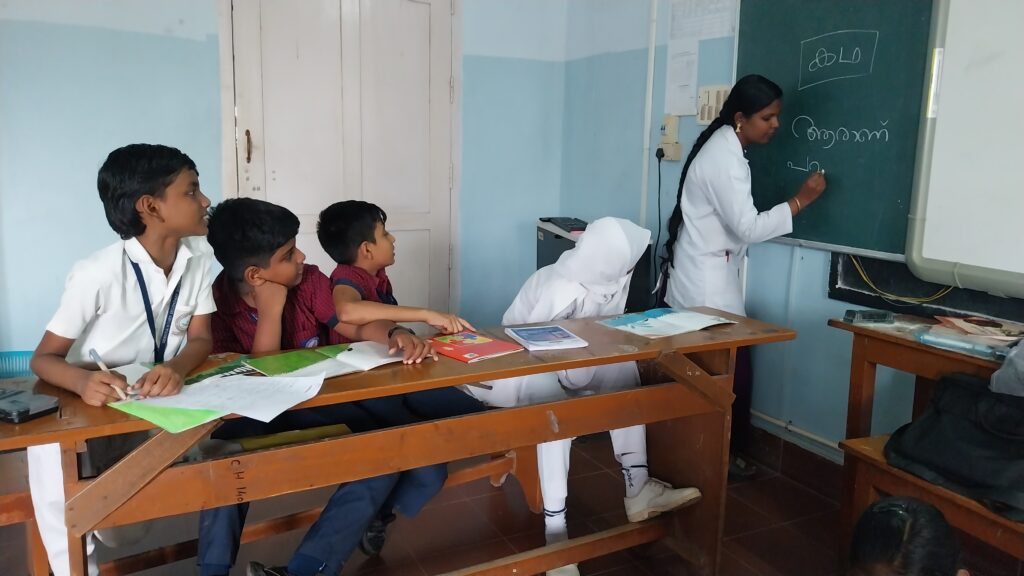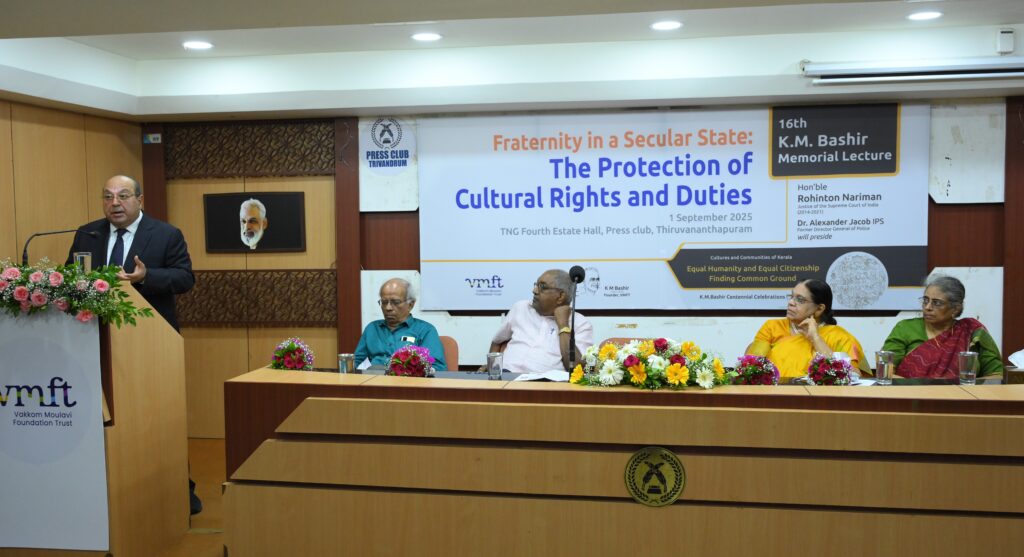On June 28, 2025, the Vakkom Moulavi Foundation Trust (VMFT) inaugurated a year-long centenary celebration to honour the birth of Shri K.M. Bashir, a pioneering statistician, visionary social reformer, and the founder of VMFT. Held in a hybrid format, the event gathered distinguished scholars, civil society leaders, students, and global experts under one roof to explore the theme: Equal Humanity and Equal Citizenship: Finding Common Ground. Designed to reflect on Shri. K.M. Bashir’s legacy and reimagine VMFT’s vision for the future, the day-long event featured a vibrant mix of addresses, academic sessions, and a public lecture.
The day began with a thoughtful and resonant address by Prof. Jameela Begum, President of VMFT and Former Dean, Faculty of Arts, University of Kerala, who emphasized the urgent need to deepen constitutional and democratic literacy in society. She spoke of the illusion of equality in Indian society and called for a shift from performative equality to real equality of opportunity. Pointing to systemic caste and class discrimination, she urged collective civic engagement, particularly from the youth, and invoked global icons like Nelson Mandela and Elie Wiesel to highlight the human capacity for hope and healing amidst suffering. “Are we really human if we have no humanity?” she asked, challenging listeners to think of equality as a lived and actionable ideal rather than a rhetorical one. Her remarks laid the moral and intellectual foundation for the sessions that followed.
This was followed by a moving centennial address from Dr. Sajitha Bashir, Executive Vice Chairperson of VMFT and an international development expert with decades of experience at the World Bank. Speaking from New York, Dr. Bashir offered a personal and professional reflection on her father’s life. She highlighted that for Shri K.M. Bashir, the ideals of equal humanity and equal citizenship were not theoretical constructs but living principles woven into his thinking and actions. From a modest background in rural Kerala, Shri K.M. Bashir’s life journey took him through India’s highest statistical bodies and eventually to Geneva, where he worked at the International Labour Organization. Through it all, his belief in education, employment, and inclusive institution-building never wavered. Dr. Bashir shared how her father believed that charity offers temporary relief, but institutions provide sustained empowerment. VMFT, therefore, was envisioned not just as a tribute to Vakkom Moulavi or his own legacy, but as a space for critical reflection, secular engagement, and knowledge-led social reform. “VMFT must not stand for narrow sectarian interests, but for unity through understanding,” she affirmed.

The inaugural keynote by Dr. G. Gopakumar, former Vice Chancellor of the Central University of Kerala and a widely respected political scientist, traced the evolution of democracy and social justice in India. He offered a panoramic view of Kerala’s social progress and reform movements, from the Vaikom Satyagraha to the opening of temples to all castes in Travancore, and explored the foundational inequities India inherited post-independence. He argued that while India adopted universal adult suffrage at inception, economic and social equality lagged behind, creating persistent contradictions. Dr. Gopakumar emphasized that the solution lies not in abstract ideals of equality, but in equity, expanding access to education, resources, and representation. He commented on the erosion of civil society and urged institutions like VMFT to fill this vital democratic space. “Even in Kerala, civil society is weakening,” he noted. “We must reinvent democracy by giving it more depth and reach.”
The panel discussion featuring Dr. John Samuel, Dr. M. Sarngadharan, Dr. Maya Pramod, and Dr. Ashraf Kadakkal served as a powerful and timely reflection on the evolving meaning of democracy, inclusion, and social justice in India. The session brought together diverse perspectives rooted in lived experience, scholarship, and decades of public engagement.
Mr. John Samuel, a noted governance and human rights expert, spoke about the construction of “imagined communities” and the growing hold of dominant caste and class interests over key institutions and national narratives. He emphasized how these forces manipulate identity, differentiating between “good” and “bad” citizens, particularly within minority communities to entrench exclusion and fear. He called for stronger counter-discourses rooted in constitutional values, civic participation, and collective action to reclaim the democratic space from majoritarian politics.
Prof. M. Sarngadharan reflected on the deeper philosophical roots of “equal humanity,” stressing that beyond political equality, we must also build a society that honours emotional, spiritual, and mental well-being. He critiqued how the concept of merit is frequently used as a tool to uphold caste privilege, excluding historically disadvantaged groups.
Bringing a powerful voice of lived experience, Dr. Maya Pramod highlighted the systemic exclusions faced by Dalit and Adivasi communities, especially women. She questioned the effectiveness of reservation without accompanying social, political, and economic capital. She delved into the deeply ingrained caste hierarchies in education, employment, and public discourse, urging a more honest reckoning with caste in policy and everyday life.
Dr. Ashraf Kadakkal offered a lens into Kerala’s Islamic intellectual and social heritage, urging participants to look beyond essentialist communal frames. He emphasized the historical coexistence of communities in Kerala and warned against attempts to erase or delegitimize the contributions of Muslim institutions and thinkers. Drawing from his academic background in West Asian Studies, he situated Kerala’s pluralism as a model worth protecting and deepening.
Across the board, the panelists agreed on the need to move away from abstract ideals of equality and instead ground the conversation in real, lived, and historical contexts. The Indian Constitution was repeatedly referenced as a unifying framework that must be reclaimed and reinterpreted for contemporary challenges. One of the more sobering reflections was on the lack of youth participation, raising concerns about generational disconnects and the need for more inclusive and engaging formats of dialogue.
This session stood out not merely as a scholarly exchange but as a call to action, a reminder that common ground isn’t found; it must be built, with empathy, honesty, and sustained effort.
The academic seminar chaired by Dr. B. Hariharan brought together legal scholars, student researchers, and public intellectuals who examined the structural barriers to equality in contemporary India. Presentations included critical analyses of caste, gender, and disability rights through the lens of law and constitutionalism. Advocate Suresh Vandannoor presented a powerful argument about the failure of institutions to translate legal frameworks into meaningful justice in public spheres. Dr. Anju Rajan V of Government Law College focused on the reproductive rights of women with disabilities, raising sharp questions about consent, guardianship, and bodily autonomy in the medical and legal systems. She highlighted a glaring disparity, where non-disabled women can make autonomous decisions regarding abortion with a single medical opinion, disabled women often require the consent of guardians and multiple doctors. “Who has the right to make decisions over her own body?” she asked, making a compelling case for reform. The student presenters contributed nuanced research on themes such as Article 14 of the Constitution, inter-community dialogue, and comparative equality jurisprudence. The young scholars present brought fresh insight and urgency to the discussions.
The highlight of the day was the public lecture by renowned constitutional expert Dr. Mohan Gopal. His address, titled “Finding Common Ground in the Struggle for Equal Humanity and Equal Citizenship,” delivered with unflinching clarity and intellectual conviction, offered a searing critique of India’s current socio-political structure. Dr. Gopal opened with a question, “In a society as fragmented and unequal as India, what can truly serve as a shared foundation for unity?”
Central to Dr. Gopal’s speech was the idea that despite their numerical strength, Dalits, Bahujans, minorities, women, and the poor remain excluded from real power. India, he argued, is not a functioning democracy but a caste-based oligarchy where leadership remains concentrated among a handful of dominant groups. “We don’t have a common ground,” he asserted. “Not the powerful, but the powerless should define it.” He called for a return to the Indian Constitution as a transformative moral and legal text, one that reasserts dignity and citizenship for all. He urged participants to recognize that the Constitution’s values of equality are not symbolic but practical tools for structural change.
Rejecting the homogenising narratives of “one nation, one language, one religion,” Dr. Gopal pointed out the vast demographic, linguistic, and cultural diversity of the subcontinent. He argued that India is better described as a union of communities rather than a singular nation-state. “If anyone imagines that they can have one language, one religion, one nation for the subcontinent, they’re just dreaming,” he stated, calling for an embrace of pluralism over enforced uniformity. Article 1 of the Constitution may describe India as a union of states, he explained, but socially and culturally, it is a union of thousands of distinct communities. This vision, he contended, offers a far more stable and honest basis for national unity than majoritarian nationalism.
A significant portion of his lecture examined how the anti-caste movement—once a powerful force led by thinkers like Narayana Guru, Ayyankali, Phule, Ambedkar, and Periyar—was sidelined post-independence. He argued that caste is not merely a sociological construct but a legal and constitutional problem, as evidenced by Articles 15 and 29 of the Constitution, which prohibit discrimination and affirm cultural rights. Dr. Gopal demonstrated, with data, how elite caste groups dominate leadership in the judiciary, bureaucracy, and educational institutions, forming what he termed a modern-day oligarchy. “No country can progress if your top leadership is limited to a handful of communities,” he said.
Drawing from spiritual rationalism and the teachings of Narayana Guru and Sahodaran Ayyappan, Dr. Gopal proposed a humanist foundation for social transformation. His closing call to action was a powerful invitation to scholars, activists, and citizens to renew the language of the anti-caste movement and reconnect with constitutional morality. “We must find a new language, one that reconnects with the ideals of equality,” he concluded, firmly rooting his appeal in both history and hope.
The public lecture powerfully reinforced VMFT’s mission; to serve as a platform for pluralism, justice, and intellectual courage. It reminded all attendees that the challenges of the present can only be confronted with a clear understanding of the past and a bold imagination for the future.
The June 28 curtain raiser was not merely an event of remembrance; it was a convergence of critical reflection and civic vision. Through speeches, scholarship, and spirited dialogue, the event successfully foregrounded VMFT’s commitment to building a just, inclusive, and democratic India. In honouring the legacy of Shri. K.M. Bashir, the trust reaffirmed its founding principles, education, equity, and unity through diversity, and laid the groundwork for meaningful action in the centenary year and beyond.



